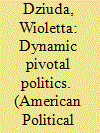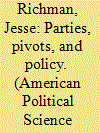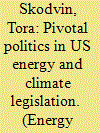| Srl | Item |
| 1 |
ID:
160558


|
|
|
|
|
| Summary/Abstract |
We analyze a dynamic extension of a parsimonious model of lawmaking in which preferences evolve over time and today’s policy becomes tomorrow’s status quo. Unlike in existing models of pivotal politics, policy makers’ voting behavior depends on the institutional environment and on their expectations about future economic and political shocks. Relative to sincere voting, the equilibrium behavior exhibits a strategic polarization effect, which increases with the degree of consensus required by the institution, the volatility of the policy environment, and the expected ideological polarization of the future policy makers. The equilibrium behavior also exhibits a strategic policy bias, which works against any exogenous policy bias embedded in the voting rule. Our analysis implies that the existing literature underestimates the inertial effect of checks and balances and overestimates the impact of institutional biases such as fiscally conservative budget procedures.
|
|
|
|
|
|
|
|
|
|
|
|
|
|
|
|
| 2 |
ID:
105176


|
|
|
|
|
| Publication |
2011.
|
| Summary/Abstract |
Identifying policy status quo locations is a precondition for testing key predictions of many spatial models of legislative politics, but such measures have proved to be extremely difficult to construct. This study applies a novel technique that measures policy locations in relation to legislators' preferences. The resulting status quo estimates allow for a direct test of the policy consequences predicted by pivotal politics and party cartel theories of legislative politics. The empirical tests indicate that parties interact with pivotal politics to contribute to policy gridlock and shape policy change. By bringing pressure to bear on pivotal politics "pivots" and by blocking policy changes that would "roll" the party, parties increase the range of policies subject to gridlock in the American political system.
|
|
|
|
|
|
|
|
|
|
|
|
|
|
|
|
| 3 |
ID:
097265


|
|
|
|
|
| Publication |
2010.
|
| Summary/Abstract |
In the 110th Congress (2007-2008) legislation related to climate change was introduced at a faster pace than in any previous Congress, yet it did not result in a corresponding increase in enacted climate-related laws. A pertinent example of the political infeasibility of climate policy change in the 110th Congress is the case of tax credit extensions for production of renewable energy. While this issue in itself was uncontroversial, the extensions were only adopted in the 11th hour, after innumerable failed attempts. With an analytical point of departure in Krehbiel's theory of pivotal politics, this paper seeks to identify pivotal legislators in the case of the tax credit extensions and discusses how changes in the composition of pivotal legislators in the 111th Congress (2009-2010) may impact the prospects of moving climate legislation more generally. The analysis indicates that a majority of the legislative pivots in the case of tax credit extensions were Republican senators representing coal-producing states. In the case of climate change, however, the regional dimension is likely to be more significant for Democratic voting behaviour. Thus, the opportunity space for climate legislation in the 111th Congress remains narrow even with a reinforced Democratic majority in Congress.
|
|
|
|
|
|
|
|
|
|
|
|
|
|
|
|